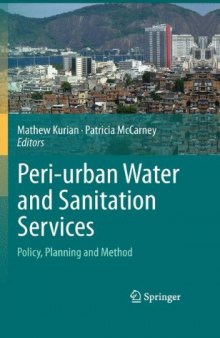 جزییات کتاب
جزییات کتاب
More than 2.6 billion people in the developing world lack access to safe water and sanitation services. The Millennium Development Goal (MDG) target is to halve the number of people without access to improved services such as a sustainable source of water supply and connection to a sewer network by 2015. That target is unlikely to be met. If there is anything that can be learnt from European development experience it is that institutional reform occurs incrementally when politically enfranchised urban populations perceive a threat to their material well-being due to contamination of water sources. Peri-urban Water and Sanitation Services, a collection of papers initially developed to support a distance-learning course at UNESCO-IHE Institute for Water Education, Delft, The Netherlands, challenges professionals to pursue water services dilemmas within a broader developmental framework that addresses issues of autonomy and accountability intrinsic to intergovernmental relations. This book draws on literature at the interface of common pool resources, co-production, new public management and political ecology to discuss important policy concerns that relate to rural-urban transformation, budget support, wastewater reuse and performance benchmarking. ‘This collection of work by some of the most important researchers on socio-ecological aspects of water and sanitation is timely. By highlighting the importance of behaviour, society and ecology on the management of water and sanitation, the editors are highlighting an area of work that has largely been neglected. For instance, why is it that so many technical fixes exist, and yet in practice, few successful projects are ever brought to scale?’ Mark Redwood, Program Leader, Urban Poverty and Environment Program, International Development Research Centre (IDRC), Ottawa, Canada ‘With global urban population now larger than rural, opening of public-private relationships and opportunities, and the globalisation of technology and capital, can needs of citizens for clean and affordable water and sanitation services be met? This book argues that the terrain is rapidly changing and provides an evidence-based approach not only to technology but also to governance systems that mediate access to public services.’ Gita Sen, Professor, Centre for Public Policy, Indian Institute of Management, Bangalore, India



 دانلود کتاب
دانلود کتاب

 جزییات کتاب
جزییات کتاب

 این کتاب رو مطالعه کردید؟ نظر شما چیست؟
این کتاب رو مطالعه کردید؟ نظر شما چیست؟
